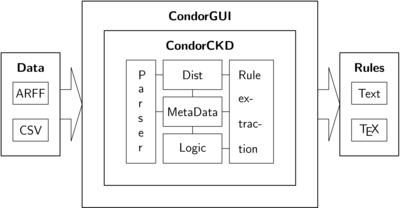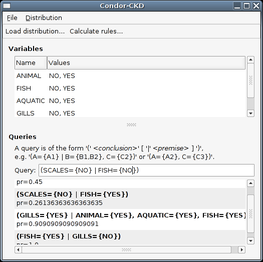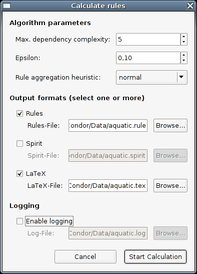Condor
The objective of the Condor project is the development and implementation of an integrative methodical platform for the processing of different kinds of uncertain knowledge, e.g. qualitative, probabilistic and semi-quantitative knowledge. This knowledge can be utilized for different tasks like knowledge discovery, inference and revision. Condor is based on a new concept for representing conditionals (if-then-rules), in which conditionals are interpreted as agents acting on so called possible worlds.
Funding
DFG – Deutsche Forschungsgemeinschaft (BE 1700/5)
Summary
The main focus of the Condor project is a novel, theoretically sound algorithm for knowledge discovery from in databases (KDD). In a very general sense, the aim of knowledge discovery is to reveal the structures of knowledge, in our approach assumed to be representable by conditionals. There are two key ideas underlying the approach pursued by our algorithm: First, knowledge discovery is understood as a process which is inverse to inductive knowledge representation. So the relevance of discovered information is judged with respect to the chosen representation method, in our case the principle of maximum entropy (ME). This way the discovered rules can be considered as being most informative in a strict, formal sense. Second, the link between structural and numerical knowledge is established by an algebraic theory of conditionals, which considers conditionals as agents acting on possible worlds.

Knowledge discovery seen as inverse to inductive reasoning.
CondorCKD
Our CondorCKD-algorithm (conditional knowledge discovery, CKD) utilizes a bottom-up approach for computing the set of most informative rules from a database. The input data is assumed to be a discrete multivariate distribution, which can be read from a CSV or ARFF file. The algorithm starts with conditionals with single-elementary conclusions and long premises, and shortens theses premises to make the conditionals most expressive but without losing information, in accordance with the information inherent to the data.
The whole CondorCKD-algorithm is implemented in the functional programming language Haskell, including a graphical user interface, and runs on Windows and Linux. It takes data in the form of CSV or ARFF files (these are formats for exchanging tabular data widely used in data mining systems or spreadsheet software) as input, and can output the computed rules in a simple text format (ready for further processing) as well as in a polished LaTeX format.

Overview of the Condor system.
International Workshops
- Workshop on Conditionals, Information and Inference 2002 (CII '02)
- Workshop on Conditionals, Information and Inference 2004 (CII '04)

